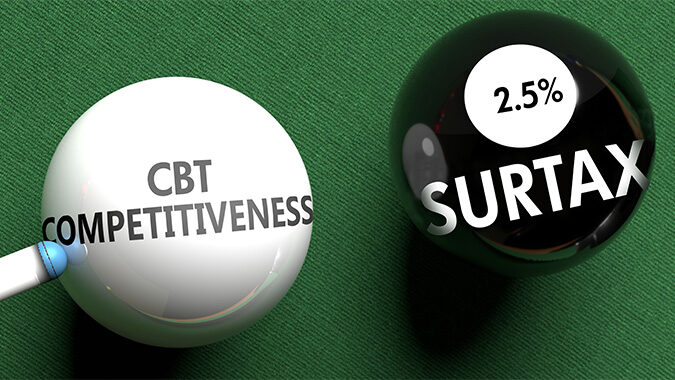While legislative leadership has yet to commit to the sunset of Corporate Business Tax surtax, strong bipartisan support for the scheduled end of the 2.5% surtax from Gov. Phil Murphy and the rest of the Legislature remains.
NJBIA President and CEO Michele Siekerka signaled optimism with the number of lawmakers who understand the value of regional competitiveness.
“It is heartening to see an understanding from the Governor and most of our policymakers that if New Jersey remains an outlier on business taxes, we are simply not competitive regionally or nationally,” Siekerka said.
“Being an outlier with CBT is a dangerous place to be, particularly with neighboring states and other states around the country making calculated and concerted efforts to reduce their rates to be more competitive. Without that sunset of the full surtax, New Jersey doesn’t go from bad to worse – it goes from worst to much worse.”
New Jersey’s current CBT rate of 11.5% is by far the highest in the nation and its rate will still be the fourth highest at 9.0% after the sunset at the end of the year.
Gov. Murphy has committed to letting the temporary surtax sunset, as scheduled, at the end of this year and has remained steadfast in that belief – even as Senate President Nicholas Scutari has publicly suggested that another extension of the 2.5% surtax is a possibility
Senate Budget Chair Paul Sarlo, dating back to NJBIA’s Public Policy Forum last December, has agreed that the surtax must expire at the end of this year.
Other lawmakers, like Assemblyman Christopher DePhillips, have drafted legislation to lower the CBT beyond the sunset.
NJBIA’s 2023 Regional Business Climate Analysis, released in February, showed New Jersey last in the region by a wide margin in terms of business taxes and cost competitiveness.
The analysis, found here, shows New Jersey maintaining the highest corporate business tax rate and property tax paid as a percentage of personal income, while also having the second highest top income tax rate, sales tax and maximum unemployment insurance tax contribution per employee among nearby states.
Pennsylvania reduced its CBT rate from 9.99% to 8.99% on Jan. 1 and is also on a trajectory to decrease its rate by 0.5 percentage points each year until it reaches 4.99% in 2031.
“Our policymakers, particularly our legislative leadership, cannot be dismissive of our business tax climate and how we rank competitively,” Siekerka added. “We are still very much a regional and national outlier in terms of cost-drivers for business, at a time when we’re supposed to be focusing on affordability for business.
“Further, we should not be dismissing the many proven benefits for New Jersey’s economy and workers of the reduction of the CBT rate. They are real and New Jersey truly stands to gain with any reduction of the CBT.”
Siekerka also said that New Jersey government “should not go back on its word” regarding its statutorily scheduled sunset of the 2.5% surtax.
“Over the past four years, businesses understood that the negotiated surtax would be temporary to assist in getting our economy on track and they leaned in,” she said. “Words matter. Businesses rely on the words of policymakers and government officials when it comes to planning and investing. They must have predictability and reliability. It’s what affords them the confidence to make investments for the longer term.
“If New Jersey were to go back on its word, our businesses would not only have to readjust their economic plans, they would also lose complete faith and trust in their government. Further, New Jersey’s reputation would be forever tarnished.
“That’s certainly not a place you want to put our largest employers or, frankly, the reputation of our great state. However, it’s encouraging to see continued strong support for the sunset of the CBT surtax at the end of this year in the Legislature. We believe they still rightfully stay the course.”

